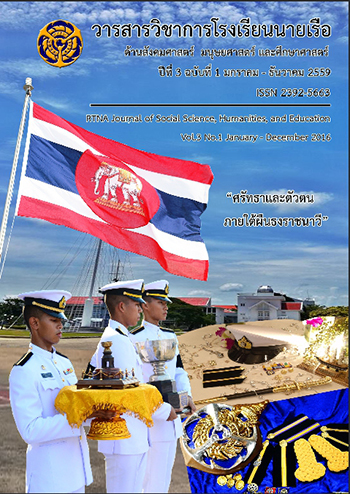การจับและการค้นของเจ้าหน้าที่ทหารเรือในการปราบปรามการกระทำผิดบางอย่างทางทะเล
บทคัดย่อ
รัฐธรรมนูญแห่งราชอาณาจักรไทย ได้ให้ความคุ้มครองศักดิ์ศรีความเป็นมนุษย์สิทธิเสรีภาพและความเสมอภาคของบุคคล การจับกุม การค้นตัวบุคคล การตรวจค้นเคหสถานหรือในที่รโหฐานรวมทั้งการจำกัดเสรีภาพจะกระทำมิได้ เว้นแต่มีคำสั่งหรือหมายของศาล หรือมีเหตุอย่างอื่นตามที่กฎหมายบัญญัติแล้วแต่กรณี การบังคับใช้กฎหมายโดยเจ้าหน้าที่ทหารเรือจึงต้องคำนึงถึงศักดิ์ศรีความเป็นมนุษย์ สิทธิและเสรีภาพตามที่รัฐธรรมนูญรับรองไว้ การจับ การค้นจะกระทำได้ก็ต่อเมื่อมีกฎหมายให้อำนาจเท่านั้น ในการจับ การค้นผู้กระทำความผิดกฎหมายในพื้นที่ทางทะเลที่รับผิดชอบ เจ้าหน้าที่ทหารเรือจะต้องมีอำนาจตามบทบัญญัติของกฎหมายที่ให้อำนาจเจ้าหน้าที่ทหารเรือเป็นการเฉพาะและกฎหมายวิธีพิจารณาความอาญา และจะต้องเป็นผู้ที่ได้รับการแต่งตั้งซึ่งเป็นบุคคลที่มีตำแหน่งและ/หรือชั้นยศตามที่กฎหมายได้กำหนดไว้ ซึ่งตามกฎหมายการจับ การค้น จะต้องมีคำสั่งหรือหมายศาล ในทางปฏิบัติการปฏิบัติหน้าที่ในทะเลของเจ้าหน้าที่ทหารเรือจึงทำได้ยาก ต้องอาศัยข้อยกเว้นของกฎหมายหรือกฎหมายที่ให้อำนาจเป็นการเฉพาะที่ให้เจ้าหน้าที่ทหารเรือมีอำนาจจับหรือตรวจค้นได้โดยไม่ต้องขอหมายที่ออกจากศาล ดังนั้นเจ้าหน้าที่ทหารเรือควรมีความรู้และความเข้าใจในเรื่องหลักเกณฑ์ดังกล่าวเพิ่มมากขึ้น เพื่อให้การปฏิบัติมีประสิทธิภาพเพิ่มมากขึ้น
เอกสารอ้างอิง
สมเจตน์ คงรอด.(2557). กฎหมายสิ่งแวดล้อมทางทะเลกับการปฏิบัติการทางทหารของกองทัพเรือ. วารสารวิชาการ
โรงเรียนนายเรือ. ด้านสังคมศาสตร์ มนุษย์ศาสตร์ และศึกษาศาสตร์ ปีที่ 1 ฉบับที่ 1 มกราคม-ธันวาคม 2557.
สำนักงานพระธรรมนูญทหารเรือ. กฎหมายให้อำนาจทหารเรือ 29 ฉบับ (ออนไลน์). แหล่งที่มา: ttp://www.navy.mi.th/judge/ วันที่สืบค้น 25 กรกฎาคม 2559.
เอกสารอ้างอิงของกองทัพเรือ (อทร.9101)
ดาวน์โหลด
เผยแพร่แล้ว
ฉบับ
ประเภทบทความ
สัญญาอนุญาต
เนื้อหาและข้อมูลในบทความที่ลงตีพิมพ์ในวารสารวิชาการโรงเรียนนายเรือ ด้านสังคมศาสตร์ มนุษยศาสตร์ และ ศึกษาศาสตร์ ถือเป็นข้อคิดเห็นและความรับผิดชอบของผู้เขียนบทความโดยตรง ซึ่งกองบรรณาธิการวารสาร ไม่จำเป็นต้องเห็นด้วย หรือร่วมรับผิดชอบใด ๆ
บทความ ข้อมูล เนื้อหา รูปภาพ ฯลฯ ที่ได้รับการตีพิมพ์ในวารสารวิชาการโรงเรียนนายเรือ ด้านสังคมศาสตร์ มนุษยศาสตร์ และ ศึกษาศาสตร์ ถือเป็นลิขสิทธิ์ของโรงเรียนนายเรือ หากบุคคลหรือหน่วยงานใดต้องการนำทั้งหมดหรือส่วนหนึ่งส่วนใดไปเผยแพร่ต่อหรือเพื่อกระทำการใด ๆ จะต้องได้รับอนุญาตเป็นลายลักษณ์อักษร จากโรงเรียนนายเรือก่อนเท่านั้น






